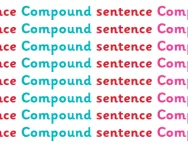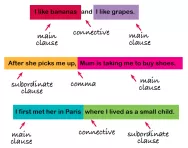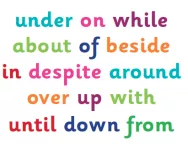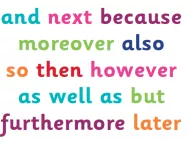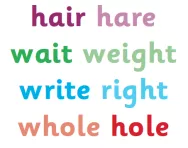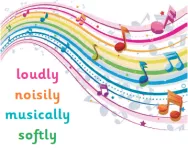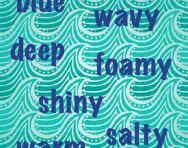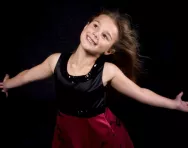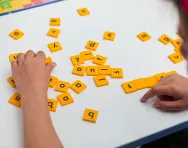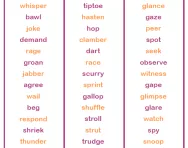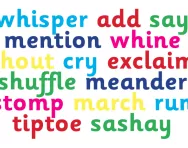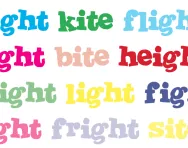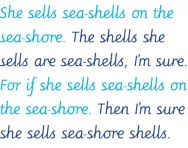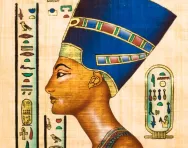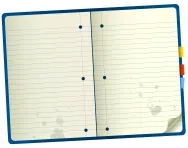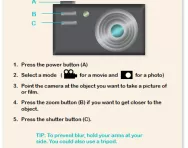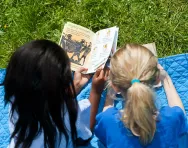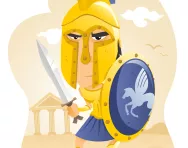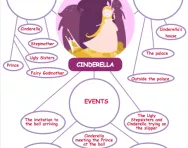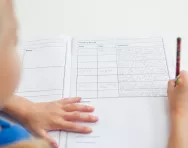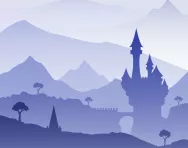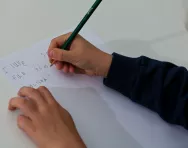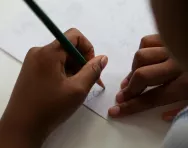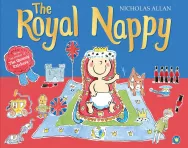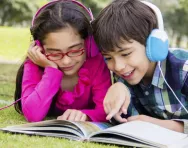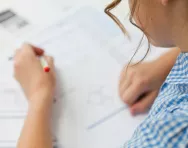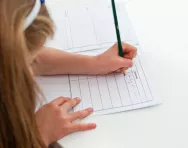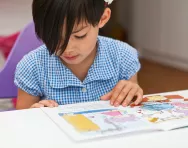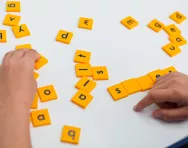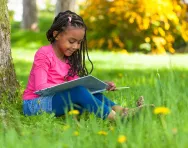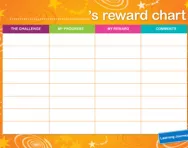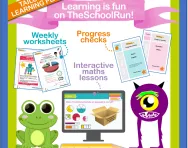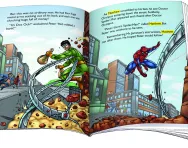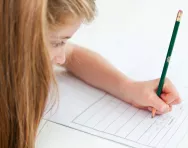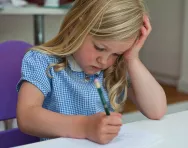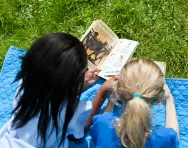What are simple, compound and complex sentences?
Simple sentences, compound sentences, complex sentences... can you identify the different types of sentence construction your child will learn in KS1 and KS2? Our parent-friendly guide sorts out any confusion and explains how your child will be taught to put grammar into practice in the classroom.
What is a clause?
From Year 1 onwards children are taught to write sentences made up of two clauses as part of sentence-level literacy work in the classroom. We explain everything you need to know about main and subordinate clauses in parent-friendly language.
What are prepositions?
Prepositions are some of the most common words in the English language. We explain how your child will learn to use them in primary school and why time connectives are so important in non-fiction writing.
What are connectives?
Has your child mentioned connectives? Connectives are joining words, and children will be taught to use them to connect phrases together into longer sentences and improve the flow of their writing. We explain what you need to know to help your child with sentence composition at home.
What is a homophone?
Homophones are tricky words which sound the same but have different meanings and are sometimes spelled differently (there, their and they're, for example). We explain how your child will be introduced to homophones in the classroom and tricks you can try at home to help them master homophone spelling.
What is an adverb?
Adverbs give us more information about a verb, explaining how, when, where or why an action is taking place. We explain how children are taught to use adverbs to improve their writing in KS2, and how you can help at home.
What is an adjective?
Adjectives describe nouns, but how will your child be taught to use them correctly? We explain how word banks and a thesaurus can help improve your child's writing by encouraging them to use effective, powerful adjectives in their work.
Encourage a love of drama and the stage
Whether your child is a diva in the making or more inclined to be backstage crew, drama and acting could help develop skills that will offer a boost in many areas of life, says Lucy Dimbylow.
10 ways word puzzles can help your child
Crosswords, word searches and hangman aren’t just handy ways to keep your child quiet for five minutes; they could also boost their learning in some surprising ways. Here’s how…
Common handwriting problems and solutions
Illegible handwriting? Huge letters? Strange pencil grip? Struggles with left-handed writing? If your child is finding handwriting hard, perhaps it’s one of these four issues. Find out more about how to tackle these common problems with advice from the National Handwriting Association's Angela Webb.
What is a word bank?
Word banks are useful tools to help improve children's writing in KS1 and KS2. Find out how to create one at home and make expanding vocabulary a whole-family project!
What are powerful verbs?
Using powerful, descriptive verbs can make a big difference to your child's writing. We explain what parents need to know about powerful verbs (and ordinary verbs!) when helping with primary-school homework.
What is a play script?
Children learn to read, write and perform play scripts as part of the English and drama curriculum in primary school. Find out about the features of this genre, as well as ways to support your child's learning at home.
What is rhyme?
From reading rhyming poems to identifying rhyme schemes and rhyming couplets, we explain everything you need to know to help you support your child's love and learning of poetry at home.
What are alliteration, assonance and consonance?
When analysing poetry your primary-school child might mention alliteration, assonance and consonance. We explain what they've been taught to look out for in literacy lessons.
What is an information text?
Information texts are an important part of primary school literacy lessons. We explain the features of this non-fiction genre, why note-taking matters and how to help your child at home.
What is a recount?
Has your child been asked to write a recount? Find out what the main features of this kind of non-fiction text are, plus how recounts are used in primary school literacy lessons.
What is instruction text?
We read instruction texts on an everyday basis. In primary school your child will be taught to recognise the main features and write increasingly complicated instruction texts as part of their non-fiction literacy work.
What is non-fiction?
Non-fiction texts are read, studied and written throughout the primary-school years. Our parents' guide covers instruction texts, recounts, information and explanation texts, persuasive writing and argument texts and explains what you need to know to support your child.
What are myths and legends?
Myths and legends are taught as part of the primary-school curriculum; as well as reading them your child will probably write their own version. We explain what parents need to know to support learning at home.
What is creative writing?
Children are encouraged to read and write a range of genres in their time at primary school. Each year they will focus on various narrative, non-fiction and poetry units; we explain how story-writing lessons help develop their story structure, grammar and punctuation skills.
What is a spider diagram?
Spider diagrams are common planning tools in the primary-school classroom, used in science as well as literacy. We explain what you need to know to help your child use a spider diagram when preparing a fiction or non-fiction piece of writing.
Book reports: what parents need to know
Helping your child engage with their reading matter and improve their literacy skills, book reports are a homework staple. So what’s involved, and how can you make them easier for your child? Lucy Dimbylow explains.
What is a story setting?
Every story has a setting, and primary-school children learn to analyse story settings in other people's writing before using the same techniques in their own fiction writing. Read on for details of how story settings are taught in KS1 and KS2.
Dyspraxia: parents' questions answered
Dyspraxia, or Developmental Co-ordination Disorder (DCD), causes problems with language, perception and thought – most specifically issues with co-ordination. Around one in seven children has this learning difficulty and if your child is affected it can be hard to know how to help for the best. Here we answer some of the most common questions parents ask.
Your child's new school year preparation plan
Each year group brings fresh challenges in literacy and numeracy. Want to give your child a head start? Primary teacher Phoebe Doyle offers some easy-to-action advice on tackling an objective from the year group your child is about to enter during the summer break.
10 of the best children's books for summer 2013
Mysteries, thrillers, supernatural tales and chick lit – we all want to pack a good book to read on holiday, whether we’re 4 or 104! From historical fiction to the new laugh-out-loud classic from Jeremy Strong, this super selection of books for KS2 readers means the whole family can have a fiction-packed break.
Listen and learn: why audiobooks are great for your child
Whether your child is a voracious reader or is horrified at the suggestion of picking up a book, audiobooks could have some surprising benefits. Lucy Dimbylow explains how they could boost literacy skills, and shares our pick of the best to get you started.
National Reading and Numeracy Tests explained for parents
All children in Wales from Y2 to Y9 take tests in reading and numeracy at the end of each school year. Find out what these tests involve, and how you can help your child prepare for them.
21 things every parent needs to know about cursive handwriting
Learning to print letters was hard enough, and now your child is being encouraged to join them up. Lucy Dimbylow explains everything you need to know about cursive writing, and how you can support your child at home.
KS1 English SATs: what is tested in the Y2 assessments
KS1 SATs are no longer compulsory, but some schools may still choose to administer them. We explain KS1 English SATs learning objectives, plus how to support your child’s literacy learning at home.
Simple ways to make spellings fun
If your child’s spellings have become the bane of your week-end it’s time to take a look at how you tackle the weekly-test challenge. Teacher Phoebe Doyle offers 10 suggestions to help make spelling practice more playful than stressful.
19 unusual ways to encourage your child to read
Some children can’t wait to get home from school, throw themselves on the sofa and get lost in Hogwarts; others wouldn’t pick up a book unprompted if their games console depended on it. Lucy Dimbylow offers some unusual suggestions to get them reading – and enjoying it.
The Learning Journey reward chart and certificates
Support your child's Learning Journey with these fantastic motivational resources – a colourful reward chart where you can set your own challenges and choose rewards together, and printable certificates to celebrate success.
How the Learning Journey works
Find out how our fantastic primary school learning programme – The Learning Journey – could benefit you and your child as well as full details of how to use the reward charts and certificates!
Best children’s books about Christmas
Get into the festive spirit with some Christmas-themed bedtime stories – perfect to snuggle up to in front of the tree, sipping mulled wine (you) and hot chocolate (them). From wintery classics to new favourites about Father Christmas and his life in the North Pole, this reading list is suitable for all ages.
Best personalised books for children
Give your child a really unique introduction to the world of fiction with a personalised book – after all, who wouldn’t want to be the hero or heroine of a fantastic adventure? Seeing their name – and face – in print, alongside favourite characters, will be a thrill whether they’re just starting to read for themselves or ready to embark on classic literature. We pick the best personalised books where your child has the starring role.
7 common dyslexia questions answered
If your child is dyslexic you'll want to help them get the support they need at school and at home. Dr John Rack, Head of Research, Development and Policy at Dyslexia Action, answers common questions about dyslexia identification, homework and tutoring and suggests sources of further information and advice to help you help your child.
Handwriting practice: what all parents need to know
If you’re worried about your child’s handwriting and want to help them improve, you’re not alone – handwriting is an essential skill, but we all have to learn it, and it’s a very complex task. Legible, neat handwriting takes lots of practice – here are a few things to keep in mind when you’re working with your child at home.
7 of the best children’s reads for summer 2012
Mysteries, thrillers, supernatural tales and chick lit – we all want to pack a good book to read on holiday so make sure your child isn’t left out! From historical fiction to the new classic from Jacqueline Wilson, this super selection of books for KS2 readers means the whole family can have a fiction-packed break.
